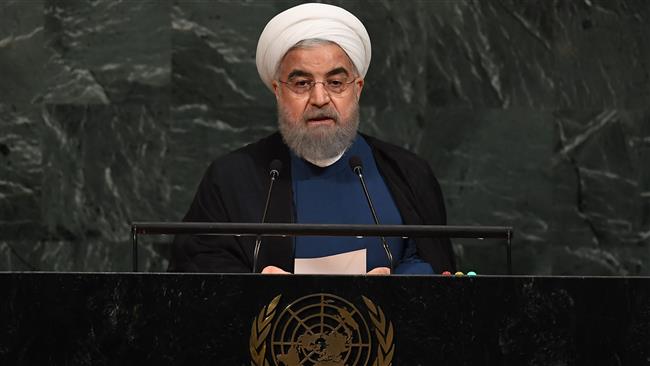In his speech to the UN General Assembly, Iran’s President Hassan Rouhani has countered Donald Trump and sought international support with an appeal for “moderation”.
On Tuesday, Trump’s address denounced the July 2015 nuclear deal — but still did not declare US withdrawal — derided the “corrupt dictatorship” of Iran’s regime, and implicitly called for its overthrow.
See Despite Trump’s Bluster, US is Not Leaving Iran Nuclear Deal
VideoCast: 5-Point Guide to Trump’s Hard-Right UN Speech
Iran Daily, Sept 20: FM Zarif Denounces “Trump’s Ignorant Hate Speech”
Without naming Trump or the US, Rouhani responded on Wednesday:
Moderation seeks neither isolation nor hegemony. It implies neither indifference, nor intransigence.
The path of moderation is the path of peace; but a just and inclusive peace: not peace for one nation, and war and turmoil for others.
Moderation is freedom and democracy, but in an inclusive and comprehensive manner: not purporting to promote freedom in one place while supporting dictators elsewhere.
Moderation is the synergy of ideas and not the dance of swords.
And finally, the path of moderation nurtures beauty. Deadly-weapons exports are not beautiful; rather, peace is.
Turning to the nuclear agreement, Rouhani continued his strategy of trying to separate the international community from Washington’s position: “[The deal] belongs to the international community in its entirety, and not to only one or two countries.” He implicitly appealed for countries to defy ongoing and new US sanctions which continue to restrict Iran’s economic recovery:
We have concluded scores of development agreements with advanced countries of both East and West. Unfortunately, some have deprived themselves of this unique opportunity. They have imposed sanctions really against themselves, and now they feel betrayed.
Amid the “moderation”, there were harsh words. Rouhani condemned Israel, whose Prime Minister Benjamin Netanyahu hailed Trump’s speech as the “most courageous” he had heard in 30 years at the UN, as “the rogue Zionist regime that threatens regional and global security with its nuclear arsenal and is not committed to any international instrument or safeguard, has the audacity to preach peaceful nations”.
And he finally pointed at Trump:
The ignorant, absurd and hateful rhetoric, filled with ridiculously baseless allegations, that was uttered before this august body yesterday, was not only unfit to be heard at the United Nations – which was established to promote peace and respect between nations – but indeed contradicted the demands of our nations from this world body to bring governments together to combat war and terror.
But, seeking the economic links necessary for both Iranian recovery and the position of his Government, Rouhani maintained the portrayal of an Iran committed only to the defense of its people — citing the 1980-1988 war with Saddam Hussein’s Iraq, he said, “We will never allow our people to become victims of such catastrophic delusions again” — and the welfare of the Middle East.
Without acknowledging Iran’s own intervention to maintain the Bashar al-Assad regime, he summarized:
I want to emphasize that foreign intervention and the imposition of alien wishes on the people of the region will only widen and deepen the crises in our region. The crises in Syria, Yemen and Bahrain do not have military solutions and can only be resolved through cessation of hostilities, and the acceptance of the will and wishes of the populaces.
“No Negotiations with US”
Rouhani used Trump’s rhetoric to promote the Supreme Leader’s position of no negotiations with the US on issues beyond the nuclear deal.
At a press conference after his address, Rouhani said, “We held negotiations for many years on [the nuclear] agreement…, but today the Americans talk of leaving the deal. So why should negotiations on other issues be held?”
He said talks with the US “would be a waste of time” in the current environment.
Rouhani entered the Presidency in 2013 with a foreign policy of “engagement”, including with the US, and persuaded the Supreme Leader to accept negotiations for a final nuclear agreement. However, Ayatollah Khamenei vetoed Rouhani’s proposal for cooperation with the US in Iraq after the rapid Islamic State claiming of territory in June 2014, and the President has never returned to the prospect of interaction with Washington outside the JCPOA.

